- Home
- Alice Hoffman
Here on Earth Page 2
Here on Earth Read online
Page 2
Gwen reaches over and locks her door. There aren’t even any streetlights out here, not for miles. If you didn’t know where you were going, you’d be lost. But, of course, Gwen’s mother knows the way. She grew up here. She must know.
“Now what do we do?” Gwen asks.
March takes the keys from the ignition. “Now,” she tells her daughter, “we walk.”
“Through the woods?” Gwen’s froggy voice cracks in two.
Paying her daughter no mind, March gets out of the car and finds herself shin-deep in water. Sloshing through the puddle, she goes around to the trunk for her suitcase and Gwen’s backpack. She’d forgotten how cold and sweet the air is in October. She’d forgotten how disturbing real darkness can be. It’s impossible to see more than a foot in front of your own face and the rain is the kind that smacks at you, as if you’d been a bad girl and hadn’t yet been punished enough.
“I’m not walking through this.” Gwen has gotten out, but she’s huddled beside the car. The mascara she applied so carefully while she waited for her mother behind the funeral parlor is now running down her face in thick, black lines.
March isn’t going to argue; she knows that doesn’t work, and in all honesty, simple logic never convinced her of anything when she was Gwen’s age. People tried to tell her she’d better behave, she’d better take it slow and think twice, but she never heard a single word they said.
March grabs her suitcase, then locks up the car. “You decide what you want to do. If you want to wait here, okay. I’m walking to the house.”
“All right,” Gwen allows. “Fine. I’ll go with you, if that’s what you want.”
Gwen gets her backpack. No way is she staying out here all alone. Not for a million bucks. Now she understands why her mother, as well as her father—who also grew up here, right down the road—never come back. The reason they’re finally visiting is actually pretty horrible; if Gwen allowed herself, she’d have a mini-breakdown right now. She’s shivering so badly that her teeth are actually chattering. Wait till she calls Minnie Gilbert, her best friend, to tell her: My teeth were chattering like a skeleton hanging on a rope, and I couldn’t even have a goddamn cigarette because there I was, right next to my mother. All for the funeral of some old woman I’m not even related to.
“Are you okay?” March asks as they make their way down the road.
“Perfect,” Gwen says.
Thursday is the day of the funeral and Gwen may faint, especially if she wears her tight black dress, which is scrunched into a ball at the very bottom of her backpack. Judith Dale was the housekeeper who raised March—whose mother had died when March was little more than a baby—and although Mrs. Dale came out to visit in California once a year, Gwen can no longer picture her face. Maybe she’s blocking it out, maybe she doesn’t want to think about nasty things like death and getting old and being stuck in a horrible place like this with one’s mother.
“Do you think the casket will be open?” Gwen asks. Finally, the rain is easing up.
“I doubt it,” March says. After all, Judith Dale was one of the most private people March has ever known. You could tell Judith anything, you could pour out your soul, and it wouldn’t be until much later, perhaps even years afterwards, that you’d realize she’d never told you anything about herself and that you didn’t even know what her favorite dessert was, let alone who she loved and what she believed in.
Now that the rain is ending, they can hear things in the woods. Mice, probably. Raccoons come to drink from the puddles.
“Mom.” Gwen says when something flies overhead.
“It’s nothing,” March assures her. “An owl.”
Not long ago there were mountain lions roaming these woods, and black bears, who came down to the orchards to eat their fill in October. There were moose who would charge anything that moved. Even when March was a girl, the sky was still so clear children in town were often disappointed to discover they couldn’t reach up and pull the stars right out of the sky.
“Are we almost there?” Gwen asks. Her idea of exercise, after all, is to ride on the back of someone’s Honda.
It is now dusk, that odd and unreliable hour when you see things which don’t exist, at least not in present time. It is almost possible for March to catch sight of the ladder her brother, Alan, left beside those sugar maples. That dark shape in the woods may be the bucket Judith Dale used to collect blueberries. And there, by the stone wall, is the boy March once loved. Unless she is very much mistaken, he has begun to follow her. If she slows down, he’ll be beside her; if she’s not careful, he’ll stay for good.
“Why are you running?” Gwen complains. She’s out of breath, trying her best to keep up with her mother.
“I’m not running,” March insists. All the same, she gives her daughter a list of reasons to hurry: Call for the rental car to be towed. Phone Richard and let him know his worries were for nothing—they’re fine and have arrived in one piece. Contact the Judge to set up a time when they can go over Judith’s estate. Call Ken Helm, who’s always done odd jobs for the family, and have him check out the house to see if repairs are needed. Surely, there are squirrels in the attic, as there always were at this time of year.
Gwen’s good boots are caked with mud and she’s freezing. “I can see why you and Dad never come back here. It’s disgusting.”
March’s shoulders hurt from carrying her suitcase, or maybe it’s just tension in her neck. This old dirt road is all uphill. Probably she should have taken Route 22 and made a left at what people in town call the devil’s corner. If Richard hadn’t been in the middle of a term and had come with her, she might have gone that way, but she’s not ready to face that piece of road with only Gwen for company. Not yet. She has told both Richard and herself that the past is the past—what happened once doesn’t matter anymore—but if this were true, would she feel as though someone had just run an ice cube down her skin in a straight line?
“I think I see the house,” Gwen announces.
Ken Helm, the handyman, was the one who found Mrs. Dale. He knocked at the door after delivering the bricks needed to repair the chimney early on Monday evening, when the sky was the color of a velvet ribbon falling over the hills. At first he’d thought no one was home, but then the wind had come up and pushed the door open, and there Judith was, in the chair by the fireplace, no longer with us. March’s father’s old friend and partner, Bill Justice, known throughout the commonwealth as the Judge, told March all of this when he phoned the next morning. At least there were no hospital stays, no pain, no heroic measures. And yet this information brings March no comfort, especially because she believes that Bill Justice, who has been an attorney for fifty years and a judge for thirty of those years, was covering the mouthpiece of his telephone in an attempt to conceal the fact that he was crying.
“That’s definitely a chimney.” Gwen squints against the darkness. “I see it now. And there’s a gate.”
On the plane ride here, March had fallen asleep, something she dreads when traveling, since she’s always logy and disoriented after napping. In her dreams, she saw her father, who has been dead for nearly twenty-five years. In March’s dream, Henry Murray was standing in the doorway to their living room, wearing the sweater that March had loved best, the brown wool one with deep pockets, where he always kept peppermint drops. He and Bill Justice were the only lawyers in the village, and although they were partners they participated in the most friendly of feuds concerning which was the more popular.
“Do you want Murray or do you want Justice?” Bill used to joke, and maybe he had to, since Henry Murray was everyone’s favorite. Children would beg for a peppermint drop each time he walked into town, and they’d follow behind, asking for a second and a third. When he died suddenly, while working late at his office, every boy and girl in the village reported smelling mint in the night air, as if something sweet had passed them right by.
Every time she thinks of her father, March experiences a sharp pain in her side. It is astounding to consider how many losses a single individual can sustain. Richard has no family left at all, except for March and Gwen, and March has little more—only her brother, Alan, from whom she’s so estranged it no longer makes sense to consider him blood, which is doubly true for Alan’s son, a boy she’s never even met.
“So this is it,” Gwen says.
They are standing at the gate.
March puts her suitcase down to take a good look.
“I can’t believe you ever lived here,” Gwen says. “Yikes.”
In the dark, the house looks tilted and old. The section that burned down—the original kitchen and dining areas—has been rebuilt as a modest addition. March lived in this house until she was twenty-one. Hers is the window above the porch roof, the one with the black shutters which need to be set back onto their hinges. That was where she spent most of her time in those last years. Waiting at the window.
Is she surprised to find that she is thinking of Hollis now that she sees that window once again? She was only seventeen when he left, but she’d already been in love with him for most of her life. That terrible winter when he went away, when the sky was always the color of ashes and the chestnut tree in the front yard was encased in ice, she began to find white strands threaded through her hair.
Tonight, in that same yard where the chestnut tree still grows, there is something jostling the quince bushes. Gwen moves as close to her mother as she can get; she’s ice, inside and out.
“Mom?”
If Gwen sounds frightened, that’s because she is. This is not what she expected when she agreed to come east with her mother for the funeral. She figured she’d miss a week of school; she planned to sleep until noon every day and eat nothing but candy bars and cereal, full
-out enjoying the break from real life. Now, on this dark night, she feels much too far from home. Who is this woman beside her, with the long dark hair and the sad countenance? Gwen, who’s brave enough—or foolhardy enough—to argue with security guards when she’s picked up for shoplifting at the Palo Alto Shopping Center, is actually shaking now. What has she let herself in for? How possible would it be to turn and run for home?
“Look,” March says to her daughter. “It’s only some rabbits.”
Sure enough, several brown rabbits are beneath the hedge of quince. The largest of them comes out, as if to do battle with March and Gwen, as if the entire hill belonged to a creature small enough to fit in a large sunbonnet or a cast-iron pot.
“Scat,” March tells the rabbit. “Go on.” When it doesn’t move she rattles her suitcase, and off goes the rabbit, into the woods. “See?” she tells her daughter. “No problem.”
But Gwen is far from convinced about this place. “Should we go in?” She is whispering, her voice a raspy, breakable thing.
“We’ll have to sleep on the porch if we don’t.”
They both have to laugh at this; it’s not too dark to see that the gutters have sloshed torrents of water over the porch. Not a place you’d want to spend the night, unless you were a centipede, or some other creepy-crawly. March reaches beneath the mailbox, and there is the extra key, wedged underneath, as always.
“You definitely lived here,” Gwen says.
March used to see this same sky every morning; she used to take these porch steps two at a time, always in a hurry, always wanting more. From where they stand, March can see Judith’s garden and instantly, she feels comforted. In spite of everything, some things remain constant. The garden is exactly as it was when March was a child. The spearmint still thrives in weedy bunches, and the scallions, with their sharp bitter scent, haven’t been the least affected by the chilly weather. The last of the season’s cabbages are nestled against the fence, as they always were in October, in neat, tidy rows, like well-behaved green toads.
Maybe she’ll regret coming back, but right now there is nowhere on earth that could feel more familiar. There, in the lower yard, March can make out the orchard, her favorite place of all. The apple trees are twisted, like little old men, their backs turned to the wind. March used to climb these trees every afternoon at this time of year, grabbing at Mc-Intoshes and Macouns, turning the stem of each apple exactly eight times as she recited the alphabet, the way girls do to learn the identity of their true love, making sure to pull the twig free only after she’d reached the first letter of his name.
2
He arrived like a bundle of mail, on a gray and windy day. March remembers it perfectly well: It was a Saturday and her father had been away for nearly a week, at a conference in Boston. For much of that time March had been slightly ill. with a low-grade fever and sniffles, and Mrs. Dale had kept her supplied with orange juice and mint tea. March had woken late that day, something she rarely did at the age of eleven, when it seemed that the whole world was right out in front of her, waiting and ready for her alone.
On that Saturday, March’s brother, Alan, normally the late sleeper in the family, was already in the kitchen drinking coffee when March traipsed in, searching for breakfast. Alan, who was ten years older than March, had graduated from Boston University, but he hadn’t done well. He’d registered to audit a few courses at Derry Law School, still hoping to follow his father in his profession, something he would never manage to do.
“We’ve got a boy,” Alan said.
“No we don’t.” Even at eleven, March knew that her brother was a braggart, and was careful not to believe much of what he said.
“Really,” Alan insisted. He had just begun dating Julie, the girl he would later marry, and was more good-natured than usual. He didn’t call March an idiot or a moron the way he usually did, or refer to her by her given name, Marcheline, for spite. “Dad brought him back from Boston. He found him wandering the streets or something.”
“Yeah, right,” March had said. “Liar.”
“Want to make a bet?” Alan said. “How about your allowance for the rest of your life?”
Judith Dale came in with a basket of laundry she had taken off the line. She wore her hair caught up in those days, and she favored slacks and cardigans, along with peace and quiet.
“People can’t just get people,” March said. “Can they?” She always turned to Judith to back her up, but now Judith shrugged. She was hazy about details, but she admitted she had made up the guest bedroom with clean sheets and a quilt that was usually stored in the attic.
March went to the window, but she couldn’t see a thing. Alan came up behind her, eating a piece of buttered toast and flicking the crumbs from his chest.
“He’s right there,” Alan said, pointing toward the orchard.
And true enough, there he was, just beyond the gate. He was thirteen and skinny, with long, dark hair that hadn’t been washed for weeks.
“What a prize,” Alan said, with his usual disdain.
The boy must have felt himself being watched, because he suddenly turned and glared at the window. The clouds were thin and wispy that day, blown about by the wind.
When March waved, the boy was so surprised that he just stood there, blinking. March would have laughed at his discomfort if she hadn’t realized, all at once, that she did not want to stop looking at him.
“Do we get to keep him forever?” March could sense, deep inside, that it was better to whisper.
“God, I hope not,” Alan said.
Out in the orchard, the boy continued to stare at her. The grass hadn’t yet been mowed that season and all the daffodils were closed up tight, to protect themselves from unpredictable weather.
“I’ll take him,” March volunteered.
“Get serious,” Alan had said, but when he walked away March stayed precisely where she was.
“I am serious.” she said out loud, although there was no longer anyone who could hear her. Nearly thirty years later she can still recall the way those words felt in her mouth, how delicious they were, how absolutely sweet. “From now on, he’s mine.”
Everything she knew about him, she learned from Judith Dale. He’d been an orphan in Boston, so poor he’d eaten nothing but crackers and whatever else he could steal. Few people would give him the time of day, let alone a dollar for his supper, but March’s kindhearted father had brought him home.
“And that’s all we know?” They were sitting out on the porch on a fine, blue day, filling up the bird feeders Judith liked to hang from the chestnut tree. “What about his parents? His religion? Does he have brothers and sisters? Are we sure he’s thirteen?”
“You are so nosy,” Judith said. “His name is Hollis and he’s here to stay. That’s all you need to know.”
At first, the new boy wouldn’t eat dinner—not even when there were lamb chops and asparagus, then strawberries for dessert. He wouldn’t look anyone in the eye, including Henry Murray, whom he obviously respected, for Mr. Murray was the one person to whom Hollis didn’t talk back. He was certainly fresh enough to most people, but in an edgy, self-contained fashion. It was the way he looked at you that could make you nervous. It was everything he didn’t say.
After three months, Hollis was still avoiding them all. The less he revealed, the more interesting March found him. She kept wishing she’d run into him, but when she did—once when he was throwing rocks at some invisible target beyond the orchard, and again when they all but crashed into each other in the hall one night en route to the bathroom—she was completely mute in his presence. Since March had always been a great one for talking, this behavior was particularly puzzling.
“Speak up,” Judith Dale would have to tell March whenever Hollis was near, but March couldn’t oblige. She even took to drinking rainwater, which she had overheard Mrs. Hartwig, a matron who worked in the school cafeteria, vow was a sure cure for a tongue-tied child.

 The Story Sisters
The Story Sisters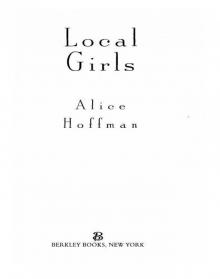 Local Girls
Local Girls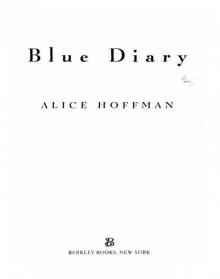 Blue Diary
Blue Diary The River King
The River King Here on Earth
Here on Earth Illumination Night: A Novel
Illumination Night: A Novel The Marriage of Opposites
The Marriage of Opposites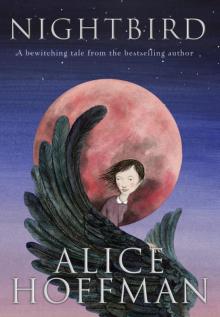 Nightbird
Nightbird Incantation
Incantation Skylight Confessions
Skylight Confessions The Ice Queen
The Ice Queen Second Nature
Second Nature Fortune's Daughter: A Novel
Fortune's Daughter: A Novel Seventh Heaven
Seventh Heaven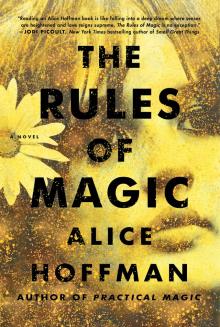 The Rules of Magic
The Rules of Magic The Red Garden
The Red Garden The Third Angel
The Third Angel White Horses
White Horses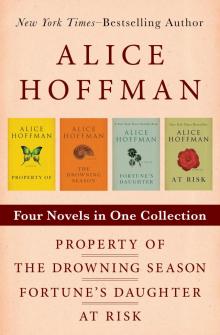 Property of / the Drowning Season / Fortune's Daughter / at Risk
Property of / the Drowning Season / Fortune's Daughter / at Risk Angel Landing
Angel Landing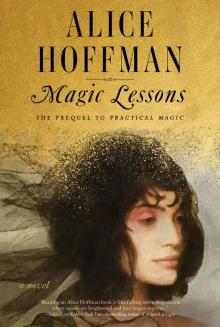 Magic Lessons
Magic Lessons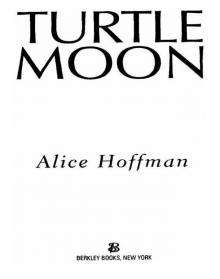 Turtle Moon
Turtle Moon Aquamarine
Aquamarine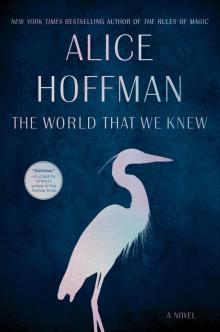 The World That We Knew
The World That We Knew Faithful
Faithful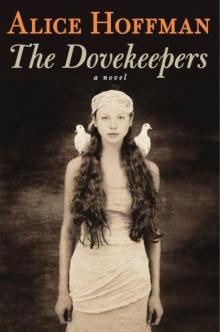 The Dovekeepers
The Dovekeepers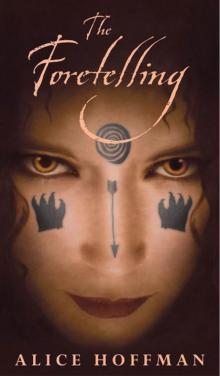 The Foretelling
The Foretelling Green Angel
Green Angel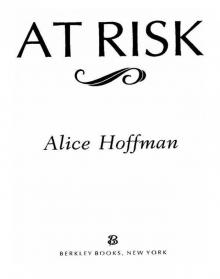 At Risk
At Risk Green Heart
Green Heart Fortune's Daughter
Fortune's Daughter Faerie Knitting
Faerie Knitting Incantation (v5)
Incantation (v5) Green Witch
Green Witch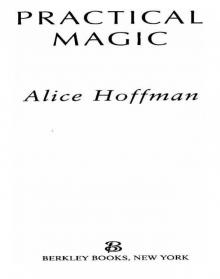 Practical Magic
Practical Magic The Museum of Extraordinary Things
The Museum of Extraordinary Things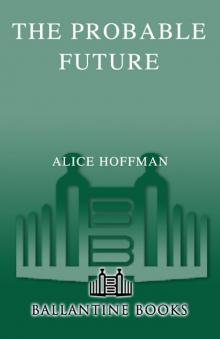 The Probable Future
The Probable Future Illumination Night
Illumination Night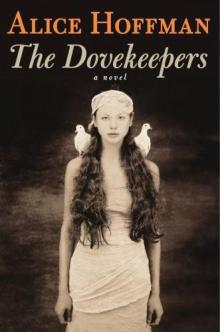 The Dovekeepers: A Novel
The Dovekeepers: A Novel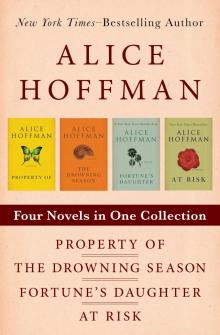 Property Of, the Drowning Season, Fortune's Daughter, and At Risk
Property Of, the Drowning Season, Fortune's Daughter, and At Risk